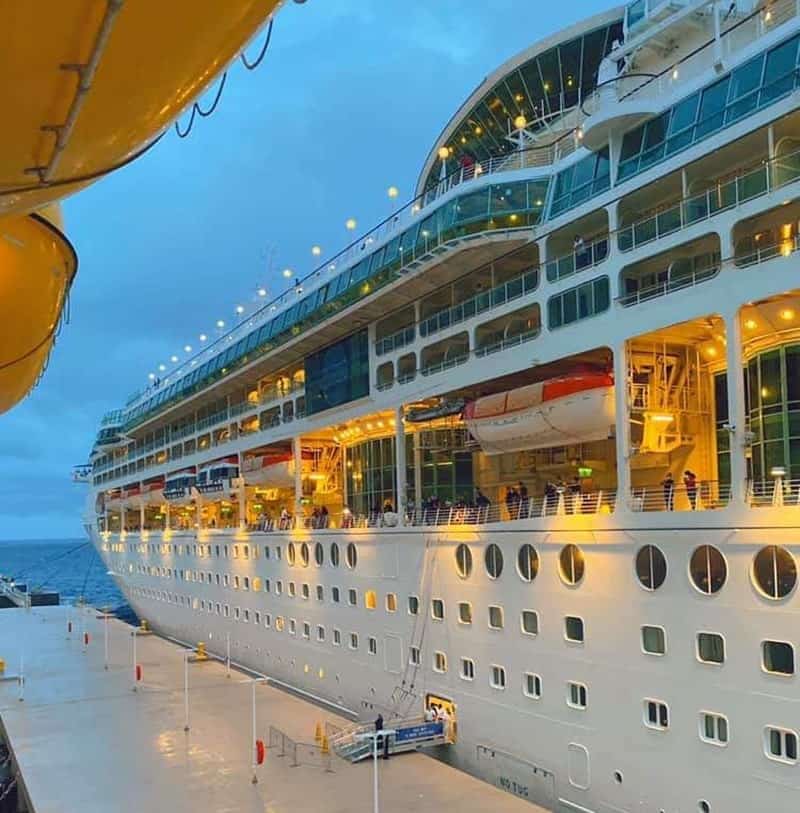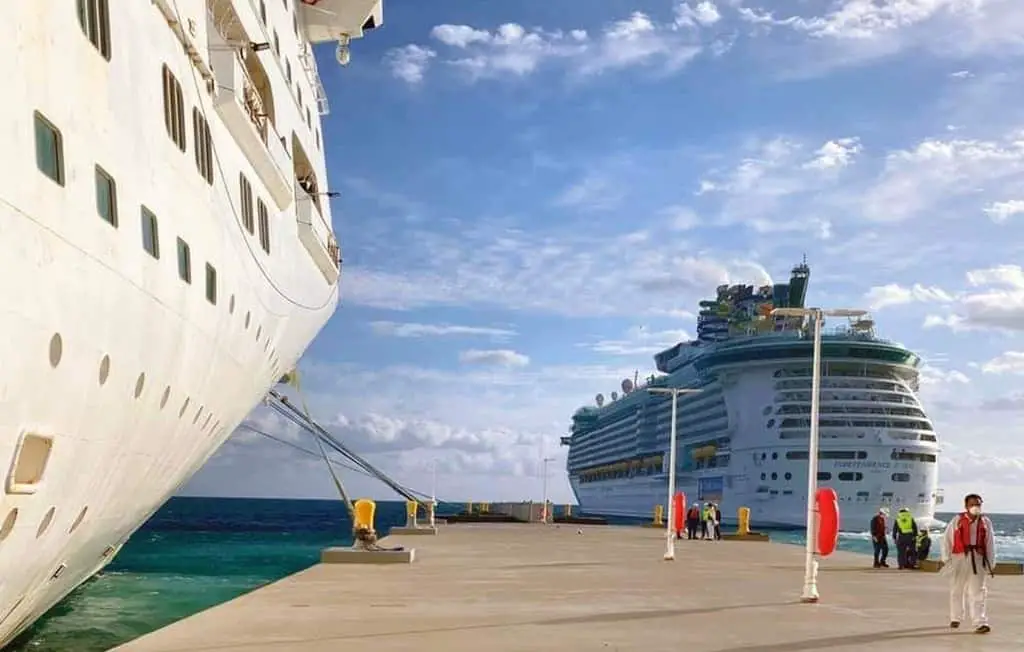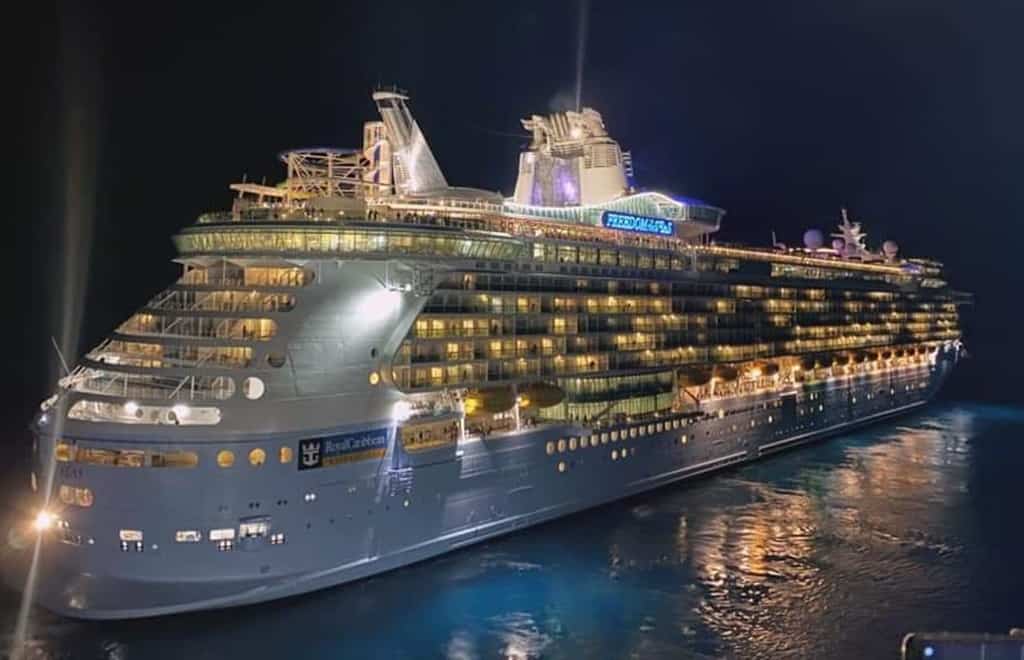Working on cruise ships: how do I get a job on a cruise ship? How much money do cruise ship employees make? Is it easy to get a job on a cruise ship? These are the most common questions of all of those who would like to experience life at sea and get a job on a cruise ship. In this article, I’ll give you some basic information on how to apply for cruise ship jobs.
Please note that I am not a recruitment agency. Adventour Begins is my personal blog where I share insider information on working on cruise ships and ship life based on my own experience.
Before I applied for a cruise ship job, I already knew which position I was going to apply for, as I previously had experience in a similar branch of the tourism industry. At that time I had a land-based job at an incoming tour agency in my country but decided to switch for something more dynamic, better paid, and allowing me to gain experience and travel the world. I was lucky to get the job of Shore excursions staff one month after I applied for that position. And, that’s where my journey began.
Recommended article: Life of Shore Excursions Staff Onboard a Cruise Ship: Job Description and Daily Duties
Things to Consider Before You Apply for a Cruise Line Job
There are several ways to apply for a cruise ship job. But, before you apply, I advise you to think twice and reconsider if life at sea is suitable for you or not. It may seem fun, and it is fun, but at the same time it’s hard work and many people give up soon after they’d started.
The reason? Life at sea is challenging, demanding, and sometimes tough, and not many people are ready to give the comfort of the “normal” life on land and switch is for 24/7 ship life with no day-off during the whole length of the contract.

Once you start your life at sea, after some time you’ll start to miss small, ordinary things you have at home, such as having a peaceful morning off with a cup of coffee in front of the TV in your living room or garden, or a weekend getaway to the countryside. That’s how I usually start to feel after a couple of months on board: I just want peace, my own spacious room, and the luxury of planning my day with my loved ones. Yes, luxury.
Also, most of the cabins onboard cruise ships are double-shared and don’t have a window. I remember I once dreamed a few nights in a row about having a window and birds waking me up in the morning… silly, right? Well, once you start working on a cruise ship, you’ll start appreciating those small, seemingly insignificant things. Not to mention being apart from friends and family for a long period of time.
For further information on what to expect on a cruise ship once you join as a new hire, check out my articles:
10 Things To Know Before Applying For Cruise Ship Jobs
New Hire? This is How the First Day on a Cruise Ship Looks Like
11 Things You Would Never Expect to be Part of Your Cruise Ship Job
Ok, let’s get back to the topic.
How to Get a Job on Cruise Ships?
1. Apply for a Cruise Ship Job through a Recruitment Agency

This is one of the most common ways to apply for cruise line jobs. Large cruise companies have their official licensed recruitment agents and hiring partners worldwide in charge of receiving and processing job applications, and arranging individual and group job interviews.
Cruise companies don’t have agents in every single country in the world, so sometimes one recruitment agency covers the whole region and neighboring countries.
For example, I come from Belgrade (Serbia) but I applied through the Croatian agency Uspinjaca: for the position of Shore excursions staff onboard Royal Caribbean International. There is also another recruitment agency in Belgrade that I contacted: Safe Cruise, but this agency was only hiring for Princess Cruises and a few other cruise lines I wasn’t interested in. Also, it wasn’t possible to apply for the position that I wanted (Shore excursions staff), so I gave up on them and went for the Uspinjaca recruitment agency.
So, if you want to apply for a cruise ship job through a recruitment agency and you are not sure if there is one in your country, my advice is to contact our best friend Google, type in the information you search for (for example: “cruise ship jobs recruitment agency India”) and Google will pop up the list of cruise ship job recruitment agencies websites where you can apply.
You can check out the websites of a few recruitment agencies recruiting worldwide: https://www.allcruisejobs.com/ and https://cast-a-way.com/ and check out the vacancies. Once you contact them, they will direct you on what to do next.
See the list of Cruise Ship Hiring Agencies in India in my article: Food and Beverage Department – Working as a Cruise Ship Waiter

Of course, keep in mind that your application will depend on the current job openings. Sometimes, you’ll apply for a position and wait several months for an interview. It all depends on whether cruise companies have job openings for the position you applied for or not, but also it depends on your experience in that field if you have the required qualifications or not.
I know people who have been waiting for over a year just for an initial interview with cruise company representatives, so be aware that this process can be long and exhausting.
Also, a very important thing to bear in mind is that the agencies can be manipulative sometimes and try to trick you into applying for some other positions the cruise company needs at that moment, so you end up as a dishwasher instead of the assistant waiter (I take this as an example, it’s the same department but different job positions). Always be specific about the position you’re applying for, double-check and go for it.
Search for cruise ship jobs on Jooble.org
1.2. Apply through a Concessionaire Company
Concessionaire companies are independent companies in charge of hiring employees worldwide to work onboard cruise ships. These companies normally recruit people for specific onboard departments, such as Spa, Sales, and a few other departments.

It’s important to note that these companies are independent, separate from cruise ship companies. Their main task is to provide training for future cruise ship employees, guide them through the complete hiring process, and prepare them for work on a cruise ship.
Being independent, concessionaire companies have special contracts with cruise companies and rent out their space or run business onboard cruise ships. It means that all spa services you get on board a cruise ship or shops you buy at, do not belong to the cruise company: the cruise company only provides the specific venues and areas where Concessionaires sell their products.
Therefore, the employees working in those departments work for a Concessionaire company, and they are not cruise company employees. However, they need to comply with the company’s rules and have the same crew member status as the rest of the cruise ship employees.
As for the Concessionaire companies, one of the largest ones recruiting for the Spa department is Steiner company based in north London. This company provides training for all their employees at their Academy in London, and once you pass, you’ll wait until they call you and give you further information regarding your contract. You can check out their website for more information: https://www.theonboardspa.com/

2. Apply for Cruise Ship Jobs Online (on the Cruise Company’s website)
Another way of applying for a cruise ship job is directly online. On the official website of every company, there is a career section (usually on the bottom of the home page) where you can send your CV and fill in the application for a required position. Or, you can just type the name of the company and put the word careers next to it, and it will direct you to their career section (ex. “princess cruises careers”).
- Royal Caribbean Group Careers (Royal Caribbean International, Celebrity Cruises, Azamara, Pullmantur, Tui Cruises, Silversea) https://jobs.rclcareers.com/
- Princess Cruises https://www.princess.com/careers/
- Carnival Corporation (Carnival Cruise Line, Holland America Line, HAP, Princess Cruises and Seabourn in North America; P&O Cruises and Cunard in the United Kingdom; Costa Cruises in Southern Europe; AIDA Cruises in Germany; and P&O Cruises in Australia) https://jobs.carnival.com/
- MSC Cruises Careers https://www.careers.msccruises.com/#/
- Norwegian Cruise Line https://careers.norwegian.com/
- Disney Cruise Line https://jobs.disneycareers.com/disney-cruise-line
- Viking Cruises river ships https://www.vikingcareers.com/; and cruise ships – https://www.vikingcruises.com/
- Costa Cruises https://career.costacrociere.it/
- Oceania Cruises https://www.oceaniacruises.com/
- Virgin Voyages https://www.virginvoyages.com/
- Cunard https://www.cunardcareers.co.uk/
- P&O Cruises https://www.pocruisescareers.co.uk/
If they have vacancies for your position, the company HR representative would contact you and direct you to further steps. If they don’t have job openings, it can take a while before they reach out to you. I spoke to some people who applied online and they never got a reply back, meaning that the company probably didn’t need people for that position at that time.
Some people also applied through the Linked In social network. It is a great way to contact the company representatives, and also to get contacted by them: I know several crew members who got contacted based on the resumes they had on LinkedIn. So, if you don’t have a profile, go ahead and create one, make it look professional, and start searching – you might get lucky!
3. Apply for a Cruise Ship Job on a Cruise Job Fair

In some countries, there are cruise job fairs that you can attend and apply for various cruise ship job positions. These job fairs are normally organized once in a year (sometimes more often, sometimes less, based on companies’ business needs) in different cities worldwide. This is a great opportunity to meet and interact with other people who have the same ambitions as you, and a chance to speak to those people who already have experience in working in the cruise industry. You would meet hiring partners in person and get detailed information on every topic you’re interested in.
If you are attending a job fair, make sure you have your resume, cover letter, and letters of recommendation ready for hiring partners. The more you look professional and prepared, the better are the chances of getting contacted by the agency.
More information on the cruise job fair website: https://www.cruisejobfair.com/
How to Apply for a Cruise Ship Job in Another Department (if I Already Work in a Different Cruise Ship Department)?
When it comes to switching departments, I can only give you a few tips here. You can always apply using regular, official ways of applying what I write about in this article. Of course, you’ll add your work experience to your CV so you might have a priority in getting the job (in this case, switching the department).
But I suggest another, more productive way (in my opinion). Use the opportunity of already being onboard and try to get in touch with the supervisor of the department you want to apply for. For example, if you want to apply for the Shore excursions department, you can get in touch with the Shore excursions manager and arrange a meeting where you can discuss your wish to apply. Normally, supervisors are very helpful and most of them will provide you with useful information or even get you in contact with the company’s HR team so you can send the application directly.
Don’t be shy and use the chance of being onboard – you might get surprised by the results!
Covid-19 Impact on the Cruise Industry

Due to the impact that Covid-19 has had on the cruise industry, bear in mind that it might be challenging to find a job on a cruise ship as a new hire until the situation in the world calms down. Thousands of crew members worldwide currently don’t work and I guess they are the ones who’ll have the priority when everything gets back to normal. Not to mention that many crew members have still been stuck on cruise ships, waiting to be repatriated home.
We all hope the situation will change soon, so everyone can get back to their work or get the opportunity to experience the cruise ship life as new hires.
How Does the Hiring Process for Cruise Ship Jobs Look Like?
1. Skype Job Interviews
After you submit your CV, you’ll be contacted by the recruitment company (or directly by the cruise company, depends on how you applied). They will arrange for an initial interview with HR representatives from the cruise company’s headquarters.
* Please, note that if you are applying through a concessionaire company, they will take care of the whole hiring process.
The date of the interview depends on whether the company needs the employees for the position you applied for or not. I’ve already mentioned that the process can take a while and that the interview can be arranged in a week or 6 months, depending on job vacancies.
I was lucky, as the recruitment agency arranged for me an initial Skype interview two weeks after I sent them my CV, cover letter, and a copy of my passport (these three things were required by the recruitment agency once I applied). I had an initial Skype interview with an HR representative from Miami headquarters (Royal Caribbean’s headquarters is in Miami) that lasted quite long actually, over an hour, but this was because I talk too much sometimes (I had a monologue of 45 minutes, I think HR guy was shocked). Anyway, I was immediately told that the interview went well and that I would have another final interview with the lady in charge of hiring for the Shore excursions department.
So, after you have an initial interview, normally they let you know either immediately or in a few days if you passed or not. If your result on an initial interview was satisfactory, they will arrange another final interview with someone in charge of your department on a cruise ship (at least in my case was like that).

The final interview can happen a few days after the initial one, or a few weeks later, again depending on how fast they need to fill out the job position.
I had a final interview literally three days later, and it was over the phone (not Skype). The HR lady asked me many questions regarding my previous job experience and many other hypothetical questions about how I would react to specific guests’ behaviors, how I would solve problems, etc.
The final interview is usually more in-depth where they check your overall experience and test how you would react in specific situations.
What if I Don’t Have Any Job Experience?
If you don’t have any experience in your field, don’t worry (I mean, you have to have job qualifications but the experience is not essential). Cruise companies are also employing non-experienced job applicants, so you don’t need to worry about it.
Cruise ship jobs are very special and different than land jobs anyway, so whoever joins the ship as a new hire needs to go through the detailed training not only regarding their job but ship life organization as well. So, if you don’t have much experience, don’t panic – we all went through the same thing, and once you come on board there will be many new hires that you’ll quickly forget about your fear. You’ll quickly adapt to the ship’s life as well, as everyone is very helpful and team-oriented.
Recommended article: New Hire? This is How Your First Day on a Cruise Ship Looks Like
2. Required Documents to Join the Ship
When you’re done with the most stressful part (the interviews), you might wait some time until the company gives you the date to join the ship.
Again, I had a lot of luck and got a date only a few days after I passed the interview. I was supposed to join the ship a month later, and I had 15-day notice to quit my previous job (and be careful there, don’t quit your previous job if you have one – until you get a cruise ship joining date), so I did everything in a hurry.
Not to mention the excitement mixed with the stress that you’re going through, as there’s a whole new world waiting for you out there!
So, I had only two weeks to collect all the necessary documents (the cruise company gives you the deadline that you need to stick to, and it’s usually two weeks before joining the ship). Every crew member who gets accepted has to create a profile on the company’s online platform where s/he uploads all necessary documents.
The necessary documents are:
1. C1D1 VISA – If your company’s headquarters is based in the USA, and you are not a US or Canadian citizen, you’ll be required to obtain a C1D1 Visa. The cruise company will send you the Letter of Employment with the specific date and name of the ship, and once you get a letter, you’ll book an appointment at the US Embassy in your country. Soon after the Embassy approves your request, you’ll obtain your C1D1 visa. The Visa cost can be covered by the company, or not, depends on the company. Mine was around 150 EUR and I was reimbursed by the company once I joined the ship.
2. PRE-EMPLOYMENT MEDICAL CHECK: In order to work on a cruise ship, it is essential that you are in a good state of mental and physical health. Your duty number 1 on board is to ensure the safety of both crew members and passengers (in both everyday life and emergency situations), so your health must be good! Medical tests vary from company to company, as well as the price you need to pay for them (yes, in most cases you pay your own medical, while in some cases the company covers the cost).

The price can range from 200$ (I paid 250 EUR and it’s considered as a low price to pay) to 1000$ (unbelievable but true!). Also, you cannot go to any clinic: there is a list of clinics approved by the cruise company and you have to go to those clinics to get checked. Sometimes, it happens that you have to travel to another city or even another country to get all tests done, which can be exhausting and stressful and, the worst part – it takes time! You have to make an appointment in those clinics, and it can take more than two weeks in some cases. Keep that in mind and make sure you always update your employer on the process progress and potential issues.
When it comes to medical tests, the company requirements vary. I had to do dental, ORL, blood and drug tests, chest x-ray, and a few others. It normally gets done in a day or can last several days, depends on the clinic. Once you get the results, you upload and submit them on your profile. They are normally valid for two years, and then you have to re-take them again.
Also, when you are a cruise ship employee, you have your medical insurance covered. Whatever happens to you during the length of your contract (God forbids), your medical is covered. There is a medical facility on board as well, free of charge for crew members.
IMPORTANT NOTE (updated on August 3, 2021) – Due to the Covid-19 Pandemic and healthy return to service, there will be new medical requirements and additional documents to be submitted by cruise ship employees before joining a cruise ship. This might include a mandatory vaccination record against Covid-19. For more details, check the “career” section and health policies on your company’s website, or go to your personal profile and check the updates (if you are already a crew member).
3. CRIMINAL BACKGROUND CHECK – Another document that you have to submit is the criminal background check that you can get in your local police department. Once you get the document claiming you have been cleared from any criminal activity, you need to have it translated by the certified English translator and submit it to the company. This document is not complicated to get, the whole process usually takes only a couple of days.

4. OTHER DOCUMENTS – There are also some other documents that you might be asked to provide, and those depend on the country of the crew members (like Seaman’s book for some Asian countries) but on the company as well.
You’ll be required to take many training sessions before you officially join the ship, and these sessions can be either online or you physically need to attend them. For many positions, such as spa workers employed by Concessionaire companies, it is required to attend Academy and different kinds of training before even getting the joining date. They physically have to attend them, meaning they have to fly to another country and sometimes pay themselves for the cost.
For some other departments, it is necessary to do many courses and training sessions online (such as safety and security training, crowd management, etc.) which can take quite a time. Once you join the ship, you’ll have extensive training for the first two weeks on board, but I’ll write about it in one of my next articles.
Ready to Join the Ship?

After you submitted all the required paperwork, you’ll be issued a flight ticket along with all necessary information on the process of coming on board. Regarding the flight ticket, it varies: the company might pay the cost or a crew member pays out of his / her pocket. Cruise companies are very thorough and you’ll be exactly told what things to bring for the work: for example, uniforms you’ll get on the ship, but shoes you’ll have to bring. This also depends on your position and the department you’re joining, and it varies from company to company.
Once you start packing, the most important thing is not to forget the documents. Yes, you will submit them online and they will get approved, but you physically have to bring the documents such as your contract, passport, your medical results, certificates, seaman’s book… Anyway, everything that the company requires from you!
Recommended article: Life Onboard a Cruise Ship: 18 Crew Cabins Must-Haves
Final Comment
To sum up, in this article I’ve done my best to describe the application process for future cruise ship job applicants. I think it’s good to have an idea of what to expect and be aware of the process as it can take time and be quite stressful.
Bear in mind that all of the requirements can vary not only from company to company but also from the position to position. For some departments such as the Marine Department, the crew members and officers (especially those on head positions) must have high job-related education and qualifications, long work experience, and different kinds of training to go for.
That’s why whoever wants to apply for a cruise ship job, it’s good to do detailed research on a specific position they are interested in or get in contact with someone who already has experience in it and get more information from that person.
I also ask you to take the information I gave you with reserve, as it’s subject to change, especially now that the Covid-19 affected the cruise industry and will probably affect the job requirements as well. Besides that, I hoped you enjoyed the article and that it was helpful.
Search for cruise ship jobs on Jooble.org
You May Also Like:
- 10 Things to Know Before You Apply For a Cruise Ship Job
- New Hire? This is How Your First Day on a Cruise Ship Looks Like
- Life Onboard a Cruise Ship: 18 Crew Cabins Must-Haves
- Crew Members Worldwide: Pandemic Has Made us Stronger
- 11 Things you Would Never Expect to be Part of Your Cruise Ship Job
- Life of Shore Excursions Staff Onboard a Cruise Ship: Job Description and Daily Duties






This sums up the process pretty accurately. Mine was slightly different in that I only had 1 interview and got the job. Also the company (atleast RCL) is very understanding if your medical takes a while, as mine ended up taking a few months, and the scheduler, bless him, just pushed back my sign on date till it was all done.
Not opin
How can i apply in your company
Hi ,
Can you please tell me what experience or education background i need to acquire in order to be eligible to work as shore excursion staff
Hello! It is preferable to have a degree in tourism, however, it is not the requirement. The most important is your experience in the travel industry and your general skills (customer service skills, communication, organizational skills, etc.) Good luck!
Thank you for replying Katarina!
I had another question that if i have work experience from a small tour agency or travel company that will be considered or do i have to work with top travel companies then only it will be accepted?
Hi Neha, any travel-related experience is valuable and being considered, no matter if it’s a small or big company you worked for. Sometimes, cruise lines even hire the people with no experience at all, which mostly depends on cruise companies’ business needs. Have a great day!